Solar Installers Salisbury
Find Solar Installer in Salisbury
Get up to 3 Solar Installer quotes for your project today! Compare profiles, reviews, accreditations, portfolio, etc... and choose the best deal.
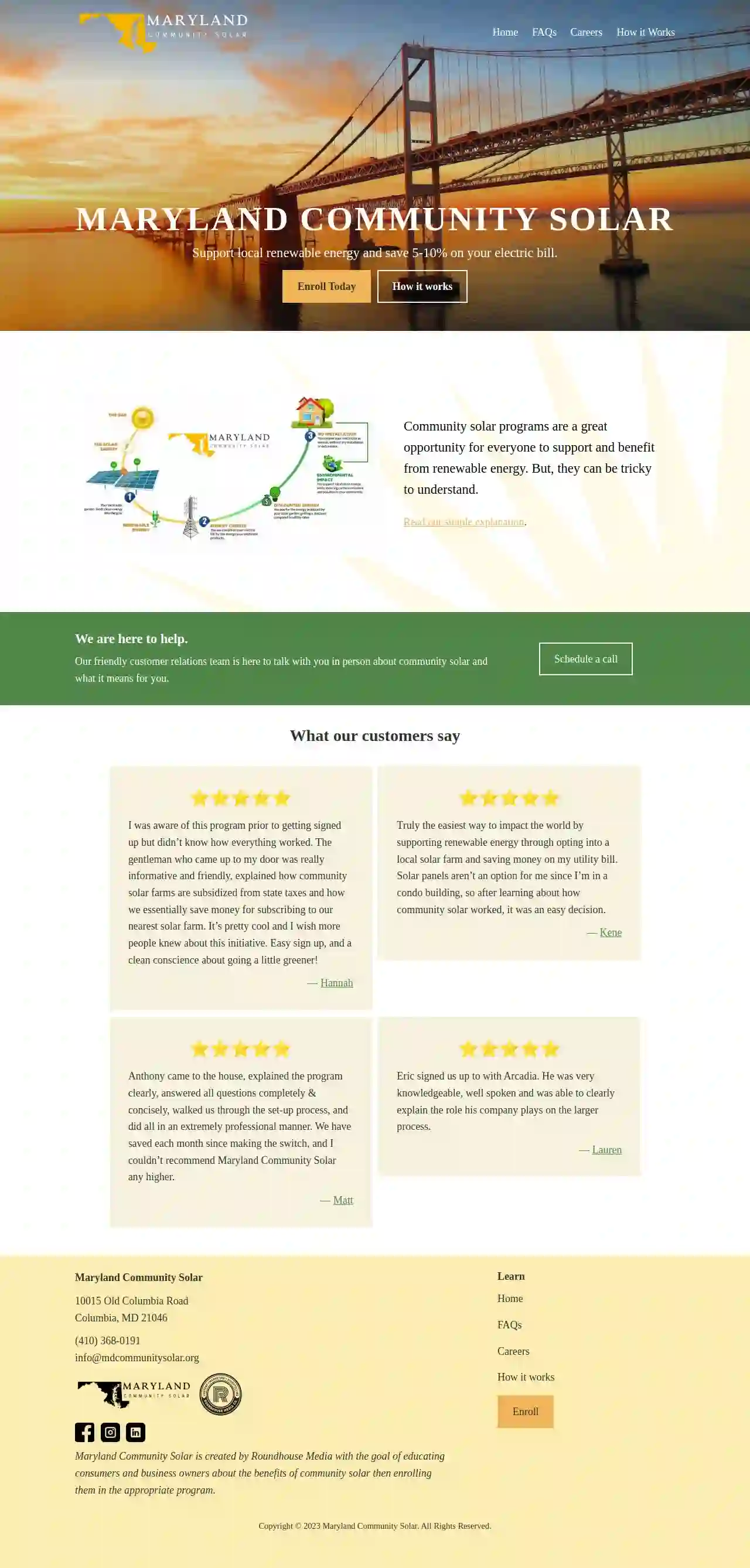
Maryland Community Solar
4.911 reviews10015 Old Columbia Road, Columbia, MD 21046, 21046, USMaryland Community Solar is a program that allows consumers and business owners to support local renewable energy and save 5-10% on their electric bill. The program is created by Roundhouse Media with the goal of educating and enrolling individuals in the appropriate community solar program.
- Services
- Why Us?
- Accreditations
- Our Team
- Testimonials
- Gallery
Get Quote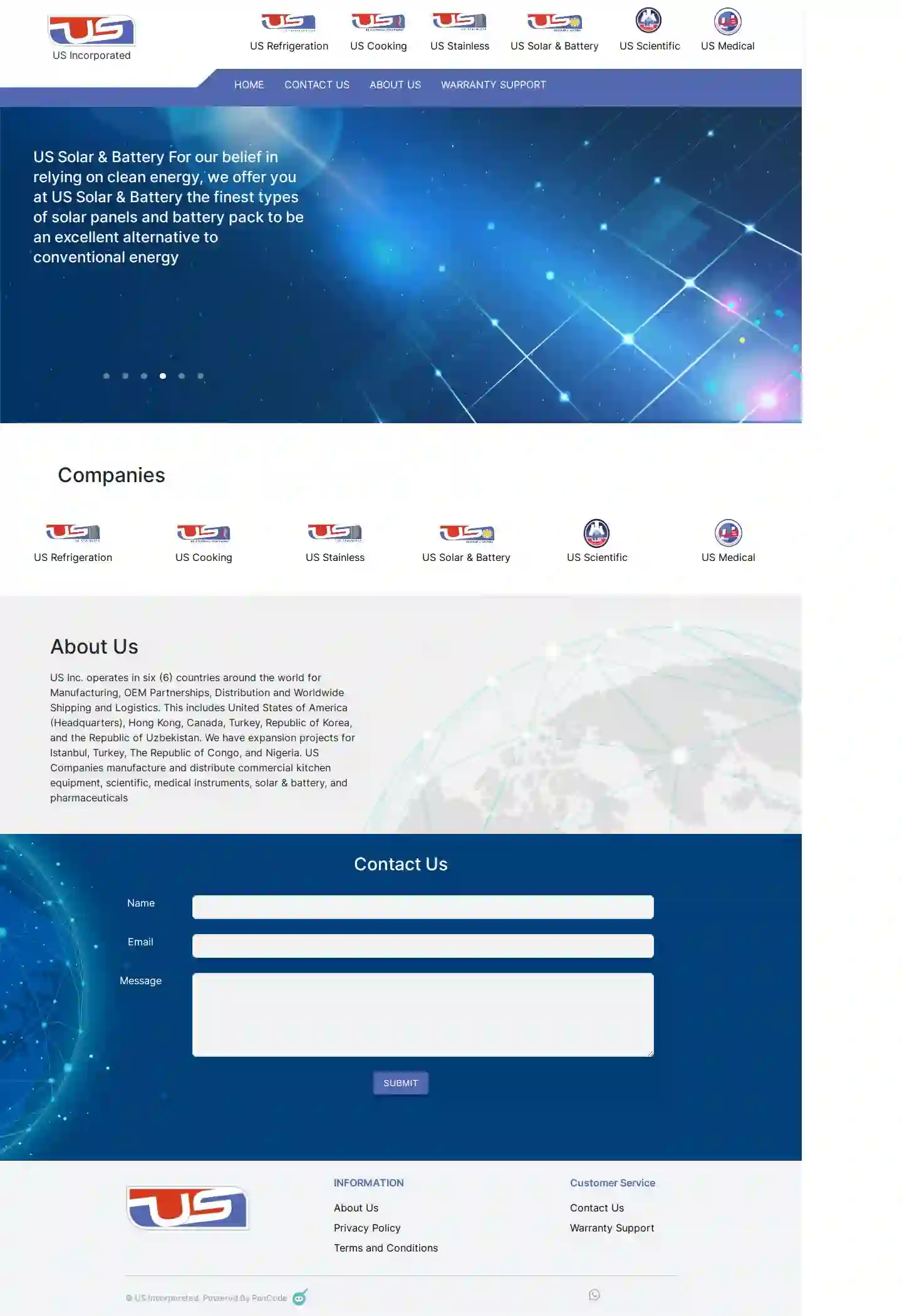
US INC
Suite 100, 123 Main St, Springfield, 12345, USUS-Incorporated is a leading provider of business incorporation services, offering a comprehensive range of solutions to help entrepreneurs establish and grow their businesses. With a strong commitment to customer satisfaction and a team of experienced professionals, the company aims to deliver personalized and efficient services that cater to the unique needs of each client. From business registration to ongoing compliance support, US-Incorporated is dedicated to helping businesses succeed.
- Services
- Why Us?
- Accreditations
- Our Team
- Testimonials
Get Quote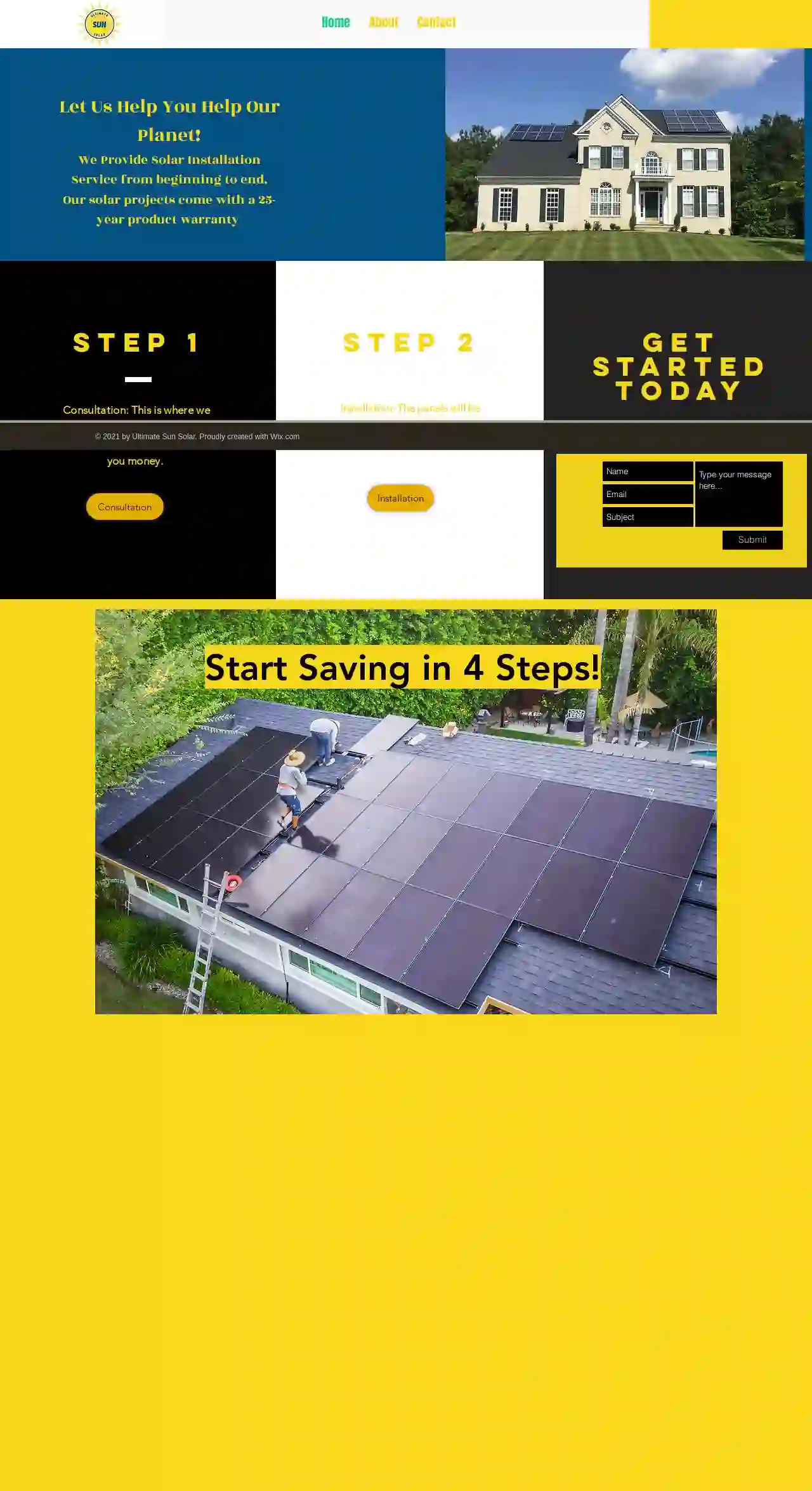
Ultimate Sun Solar
Baltimore, USWe Provide Solar Installation Service from beginning to end. Our solar projects come with a 25-year product warranty. Start Saving in 4 Steps! Consultation: Review your current power bill and find the best option to save the most money. Property Survey: Inspect your roof, electric panel, and meter location for any necessary upgrades. Design: Review and approve the final solar panel design. Install: Solar panels are installed on the roof and inspected. NOW, THE SAVINGS BEGIN!
- Services
- Why Us?
- Gallery
Get Quote
Skywave Solar
510 reviews101 Skipjack Road, Prince Frederick, 20678, USSkywave Solar is a locally owned and operated company located in Southern Maryland with years of industry experience working with PV solar system owners, roofing companies, and asset management companies. They are committed to delivering unrivaled optimized PV solar system maintenance and service. Their mission is to protect and maintain solar panel system investments through excellence in maintenance service and an unparalleled customer experience.
- Services
- Why Us?
- Accreditations
- Gallery
Get Quote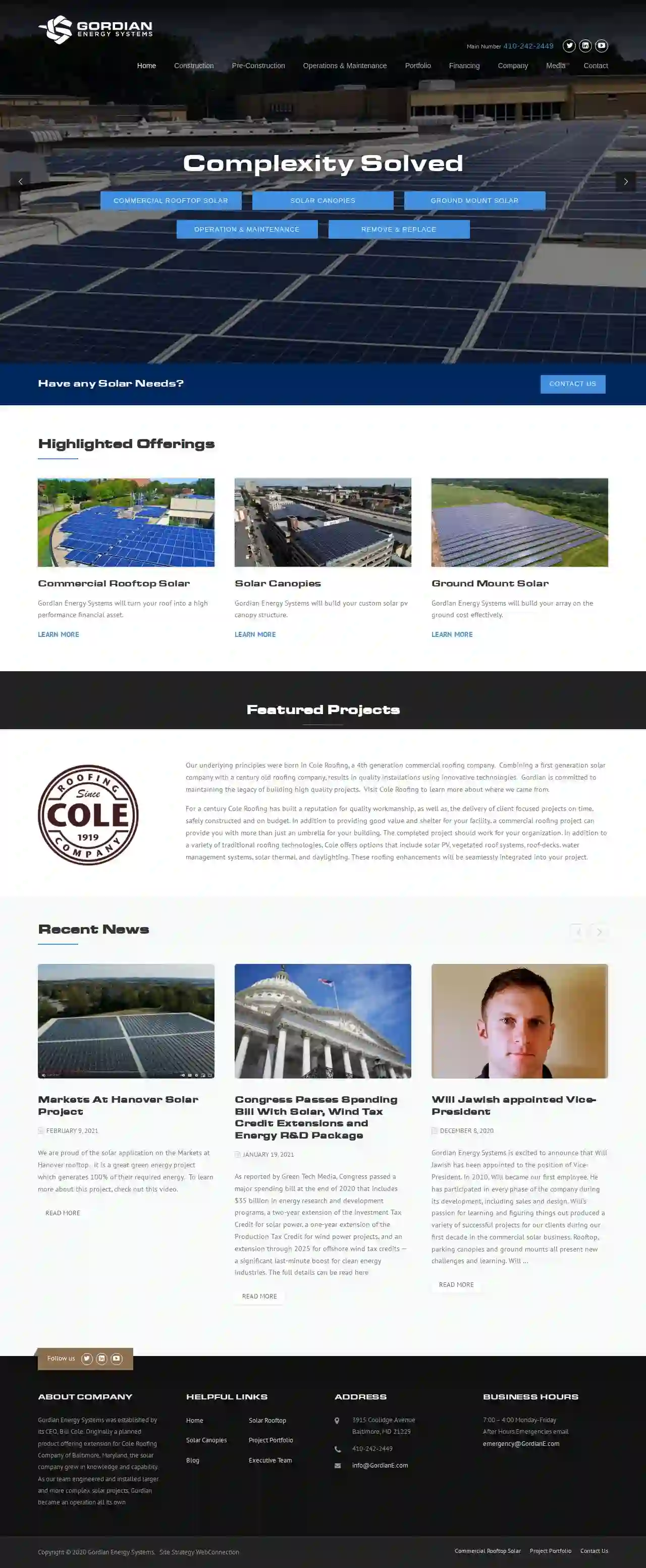
Gordian Energy Systems
54 reviewsBaltimore, MD, 3915 Coolidge Avenue, 21229, USGordian Energy Systems is a leading provider of commercial solar solutions, offering a range of services including construction, solar engineering, procurement, and operations and maintenance. With a focus on delivering high-quality projects on time, safely constructed, and on budget, Gordian Energy Systems has built a reputation for excellence in the industry. The company's underlying principles were born in Cole Roofing, a 4th generation commercial roofing company, combining a first-generation solar company with a century-old roofing company to deliver innovative technologies and quality installations.
- Services
- Why Us?
- Accreditations
- Our Team
- Testimonials
- Gallery
Get Quote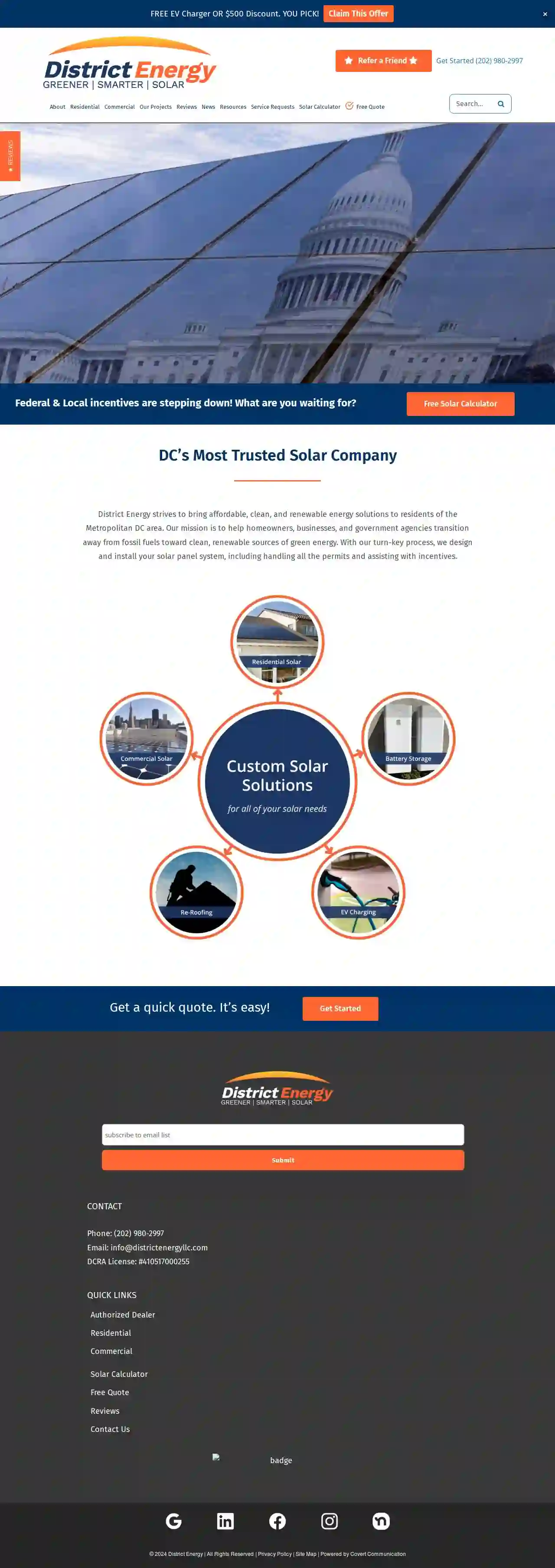
District Energy LLC
542 reviews123 Solar Street, Suite 100, Washington, 20001, USDistrict Energy LLC is a trusted solar company in the Metropolitan DC area, providing affordable, clean, and renewable energy solutions to residents, businesses, and government agencies. Their mission is to help transition away from fossil fuels toward clean, renewable sources of green energy. With a turn-key process, they design and install solar panel systems, including handling all permits and assisting with incentives.
- Services
- Why Us?
- Accreditations
- Our Team
- Testimonials
- Gallery
Get Quote
General Solar Company
4.9129 reviews123 Main St, Suite 100, Rockville, 20850, USGeneral Solar Company has been providing professional window film and glass coating installations for residential and commercial properties since 1969. Our success over the past 50 years is directly tied to our expertise. All of our professional installers have been with us for over 20 years and our salesperson has been with us for over 30 years. At General Solar Company, our expert team has the experience to help you identify the best window film product for your unique needs and budget.
- Services
- Why Us?
- Accreditations
- Our Team
- Testimonials
- Gallery
Get Quote
Energy Systems Group
9877 Eastgate Court, Newburgh, IN, 47630, USEnergy Systems Group (ESG) is a leading energy service company dedicated to creating a more resilient and sustainable future. With a focus on energy efficiency, renewable energy, and infrastructure improvements, ESG helps clients achieve their energy and climate goals while improving overall productivity and well-being. ESG serves various sectors including commercial and industrial, corrections, federal government, healthcare, higher education, K-12 schools, local and state government, transportation, and utility partners. ESG's team of engineers, project managers, construction and safety professionals, analysts, and energy experts work together to deliver practical and responsive energy and infrastructure solutions.
- Services
- Why Us?
- Accreditations
- Our Team
- Testimonials
- Gallery
Get Quote
Ultra Solar Group
510 146th Street, Suite 6, Ocean City, 21842, USThe Ultra Solar Group is a leading provider of solar energy solutions, offering a range of services including project development, engineering, procurement, and construction, as well as operation and maintenance. They are a SunPower dealer, providing high-quality solar panels and solutions for residential and commercial clients. Their team is certified and trained through SunPower and NABCEP workshops, ensuring top-notch installation and maintenance services.
- Services
- Why Us?
- Accreditations
- Gallery
Get Quote
Standard Solar Inc.
48 reviewsBeverly Hills, CA, 123 Solar Way, 90210, USStandardsolar is a leading provider of solar energy solutions, offering a range of services including solar panel installation, maintenance, and repair. With a focus on sustainability and renewable energy, Standardsolar aims to help individuals and businesses reduce their carbon footprint and save on energy costs. Their team of experienced professionals ensures high-quality service and customer satisfaction.
- Services
- Why Us?
- Accreditations
- Our Team
- Testimonials
- Gallery
Get Quote
Over 4,210+ Solar Installers on our directory
Our solar installers operate in Salisbury & surroundings!
SolarCompaniesHub has curated and vetted Top Solar Installers in Salisbury. Find a trustworthy pro today.
Frequently Asked Questions About Solar Installers
- Analyze your energy bills
- Assess your roof's suitability
- Calculate your potential solar energy generation
- Recommend a system size that meets your needs and goals.
- Your current energy usage
- The size of your solar system
- Your local electricity rates
- The amount of sunlight your panels receive
- Available net metering policies
How do I choose the right solar panel system size for my needs?
Do I need planning permission to install solar panels in USA?
How much can I save on my electricity bill with solar panels?
What happens to my solar panels during a power outage?
How do I choose the right solar panel system size for my needs?
- Analyze your energy bills
- Assess your roof's suitability
- Calculate your potential solar energy generation
- Recommend a system size that meets your needs and goals.
Do I need planning permission to install solar panels in USA?
How much can I save on my electricity bill with solar panels?
- Your current energy usage
- The size of your solar system
- Your local electricity rates
- The amount of sunlight your panels receive
- Available net metering policies